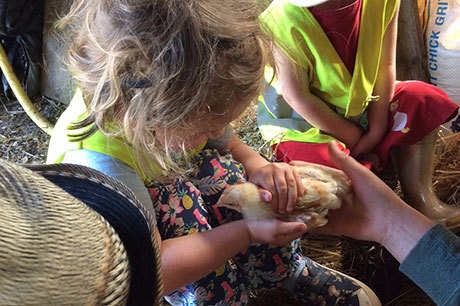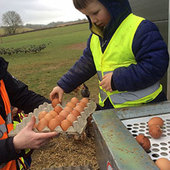
Download the PDF of this article
Farm nurseries are providing young children with a wealth of knowledge and greater enjoyment of food by getting them out and about in the great outdoors.
Janet Hickinbottom, national education officer for Linking Environment and Farming (LEAF) and LEAF Education (formed from a merger with Farm and Countryside Education), says, ‘Nurseries based on farm premises offer a unique experience for small children. Research shows that, increasingly, children and adults alike are disconnected from nature and all the proven mental and physical benefits of being outside. Farm nurseries can introduce children at an early stage to knowledge and understanding of the farm and how their food is produced.’
Initiatives backing a ‘farm to fork’ understanding of food have tended to focus on schools, but many nurseries based on farms are now doing it for themselves.
SPACE AND FRESH AIR
Jessica Wells-Hall, manager of The Farm Nursery, Cirencester, describes farm nurseries as ‘a seedbed for learning’. She says, ‘A farm nursery is a wonderful place for children to learn and develop. There is unlimited space and fresh air where they gain real-life experience and knowledge of how food gets to the table at a very early age.’
At The Farm Nursery, staff work with the farmer and head gardener on-site to find suitable tasks and activities for children to participate in. The children collect eggs, visit the milking parlour to hear about and witness the milking process, bottle-feed piglets and watch chicks grow before helping move them to the fields. They also grow all their own vegetables, and the nursery is organic and vegetarian.

Ms Wells-Hall explains, ‘Food is one of the most important factors for growth and we believe organic food is the best food for us all so that we are not putting anything unnatural into our bodies. Parents have no problem with this and feel assured that enough protein is provided in our meals. We do offer children a choice of meat or vegetarian sausages on our weekly camp fire in the woodlands.’
For every meal served at Little Barn Owls Nursery and Farm School in Horsham, staff create a centrepiece on the table which includes all the ingredients in the dish to encourage discussion and understanding.
Charlotte Middleton, head of children and adult learning at the setting, explains, ‘If we make a casserole, we’ll put pieces of all the raw veg we have used out on the table, as well as granules from the stock and anything else that has gone into the meal. This helps the children understand what they are eating and relate it to their own experience of growing fruit and veg on the farm. It also helps them make connections, like linking the eggs on the table to the quiche on their plate.’
FUSSY EATERS
Farm nurseries often find that involving children in growing and preparing food can help overcome fussy eating. Ms Wells-Hall says, ‘From helping with and observing where we get food from, the children become keener to try new things as they understand them more.
‘Since the children have been growing their own vegetables, they can’t get enough of runner beans, potatoes and courgettes. They plant them all, help weed and water, get involved in picking and digging up the produce and then get to reap the rewards. They will all now eat most fruit and vegetables and will at least give most foods a go. We give them the opportunity to make their own decisions.’
Ms Middleton agrees, ‘Children are so much more confident in trying food when they have seen the process. Time and time again we have parents tell us they can’t believe their child has eaten certain vegetables. But the children pick them and help wash and chop them, so being part of that preparation and getting that hands-on experience really increases their understanding.’
FOOD CHAIN
At Bents Farm in Halifax, children regularly visit the nursery’s host of on-site animals, which include 40 cows, 30 hens, 16 pigs, three horses, three goats, three rabbits, two guinea pigs, two ducks and a bull. Director Julie White says this proximity to animals means there is never any problem discussing the food chain.
‘Conversations about birth, death and how animals are used in the food chain are just part of our everyday routine,’ she says. ‘Children visit the animals and learn about types of meat, such as mince, gammon and sausages, through conversations with practitioners at meal times and sessions with our cook and farmer.’
Ms Wells-Hill says vegetarianism at The Farm Nursery does not stop the children dealing with issues of mortality. ‘We have seen all the animals on the farm go from baby to adult, and the children have learned so much about growth, decay and time, as well as about what animals and people need to survive,’ she explains. ‘The children themselves grow independence and confidence from this, and above all compassion towards other living beings.’
However, at Little Barn Owls, not every child is necessarily involved in these discussions. ‘We try to be open with the children but we are also very mindful of their characters,’ explains Ms Middleton. ‘Their key person in particular has to be very aware of their levels of understanding, and we work very closely with parents on how involved they want their child to be when discussing death.’
Ms Middleton says the nursery has no ‘one size fits all’ approach to addressing death and the food chain. ‘It depends a lot on children’s upbringing. Some make the connection between the chickens outside and the chicken casserole, and some don’t. Some of our children live on a farm, for example, and they can be very matter-of-fact about these things. Even some who don’t are quite happy to play with the animals and then eat a meal which has that animal in it. We very much tailor what we do based on their experiences and try to manage their emotions around that.’
She adds, ‘I know this sounds very morbid, but we have even had older children, with parental consent, involved in burying animals. This can be a helpful approach. You just need to be very aware and always use your judgement.’
FURTHER ACTIVITIES
As well as learning about nutrition, food-based farm activities can help nurseries develop other areas of learning. At Little Barn Owls, children collect eggs every morning and are in charge of taking them in to the nursery chef to be boiled for a morning snack or cooked in the lunchtime meal. First, however, they use them for counting, weighing and measuring activities.
The nursery has also developed its own farm shop role-play area, in which the children can pretend to sell mostly real food.
‘Food can be great props for role play,’ explains Ms Middleton. ‘What’s the worst thing that can happen? We have heard other settings say “we tried, but all the children did was eat the food.” But we think that’s great, because it means they’re trying stuff. They might bite into an onion and realise they don’t like it, but that’s fine, at least now they know.’
 Meanwhile, the link between children and community is strengthened at The Farm Nursery thanks to its real-life on-site farm shop and café, which is owned by the directors. Ms Wells-Hall says, ‘We eat all the same foods that the community can buy. All our snacks are bought with the children at the shop, which is literally just a stone’s throw away, and the café cooks all our lunches for us. Parents pop in to get their groceries on their way to drop off and collect their child, which also helps continue our nutritional approach at home.’
Meanwhile, the link between children and community is strengthened at The Farm Nursery thanks to its real-life on-site farm shop and café, which is owned by the directors. Ms Wells-Hall says, ‘We eat all the same foods that the community can buy. All our snacks are bought with the children at the shop, which is literally just a stone’s throw away, and the café cooks all our lunches for us. Parents pop in to get their groceries on their way to drop off and collect their child, which also helps continue our nutritional approach at home.’
The nursery only advertises through leaflets left in the café and on the shop’s social media pages, helping to maintain its local roots. The nursery directors also run a not-for-profit community interest company called The Farm Project, which offers a residential for local schools and youth groups to enjoy hands-on experience of a farm.
Ms Hickinbottom is convinced there is no better way for any children to learn than on a farm. ‘What better way to nurture a love of the countryside and an understanding of those early connections between what they see on their plates and where it is grown or reared?’ she asks.
MORE INFORMATION
Linking Environment and Farming, https://leafuk.org
LEAF Education, https://education.leafuk.org









